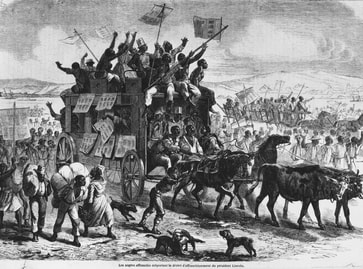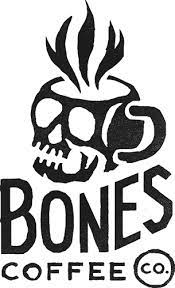 Freed slave spreading the news and copies from town to town of newspapers proclaiming the end of the war and their freedom Freed slave spreading the news and copies from town to town of newspapers proclaiming the end of the war and their freedom On September 22, 1862, President Abraham Lincoln issued the Emancipation Proclamation stating that as of January 1, 1863, all enslaved people in ALL the states, "shall be then, thenceforward, and forever free." However, while, the proclamation was mainly targeting the Confederate States to release their slaves, the view of the Civil War almost instantaneously shifted. Now, it was not just to maintain the Union, it became about ending slavery. Many of the slaves in the south didn't hear about their freedom and continued on with their lives and the slave holders, were happy to keep mum. The final skirmishes of the Civil War, which didn't finally conclude until May of 1865 (the Battle of Palmito Ranch near Brownsville, TX is documented as THE final battle). They didn't have Facebook or Walter Cronkite back then, so some didn't know about General Robert E. Lee's surrender to Ulysses S. Grant in April, just a few weeks prior. Once the terms were met, the papers were signed, and the two men shook hands, the Civil War had finally come to an end. General Grant would step onto the porch of the Appomattox Court House and announce to the crowd, "The war is over. The Rebels are our countrymen again." As Northern troops began to advance South, many slaves ran away, running North seeking freedom, they didn't know they had. Texas, however, kept the Emancipation Proclamation to themselves. Life continued on as usual. Many slave owners, in fact moved their homes and businesses to the state believing that it would be immune to the ever changing "rules" of the new country. But in June, 1865- almost 2 and half years later, General Gordon Granger and his 2,000 man troops arrived in Galveston Texas, officially FREEING over 250,000 men, women and children still enslaved. Jubilee Day- June 19. The following year, the freed people of Texas created a day of celebration- Jubilee Day. They celebrated with song and traditional food and prayer. As the former slaves began to migrate across the country, so did the celebration. It became an annual event for those to never forget the day they became free citizens. Many would return to Galveston, TX as the annual celebrations grew and grew. In 1872, a collection of African American ministers purchased 10 acres of land in Houston, naming it Emancipation Park for $800. (Over $20,000 in today's economy!). They couldn't afford to do much with the land, so it was used every year for a Juneteenth celebration. (It did have some hard times, but there are still Juneteenth festivities held at this very park!) Later, in 1979, it was Texas that declared June 19th as a day of remembrance. On June 7, 1979, Texas Legislature passed a bill declaring Juneteenth an official state holiday. It honored the Emancipation Proclamation, but the celebration focuses on the ARRIVAL of the news in Texas, as the last state was freed. Several other states followed suit and turned the day into a national holiday- some made it a paid holiday, others made it an observance holiday. However, in June, of 2021, Congress passed a resolution making Juneteenth a federal holiday. On June 17, 2021, President Joe Biden signed it into law. “How, then, can they call on the one they have not believed in? And how can they believe in the one of whom they have not heard? And how can they hear without someone preaching to them? And how can anyone preach unless they are sent? As it is written: ‘How beautiful are the feet of those who bring good news!’” (Romans 10:14-15). If there is an irony in the Juneteenth story, it is that the proclamation was made over two years prior. During those years, people were free, yet they were still living in slavery. This happened for one reason: No one had told them yet. And now... you know.
0 Comments
Your comment will be posted after it is approved.
Leave a Reply. |
A History BlogThis is a great way to connect over all things American history! Comment on podcast episodes, read quick pieces and extra segments that couldn't make a full episode! Bag of Bones Podcast partners with Bones Coffee Co! The perfect match!
Categories
All
|
Copyright © 2013 Elizabeth Bourgeret | Terms & Conditions | Privacy Policy | Contact Me I Newsletter

 RSS Feed
RSS Feed